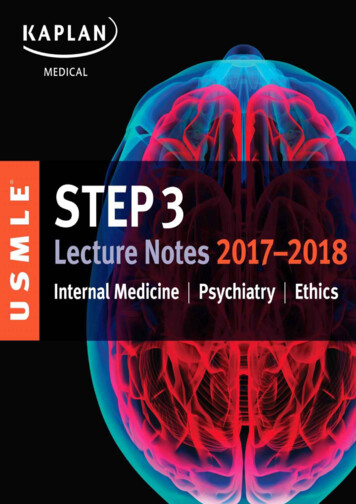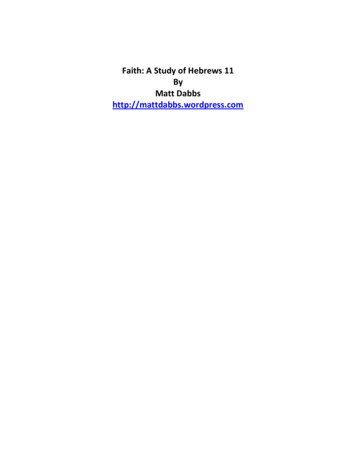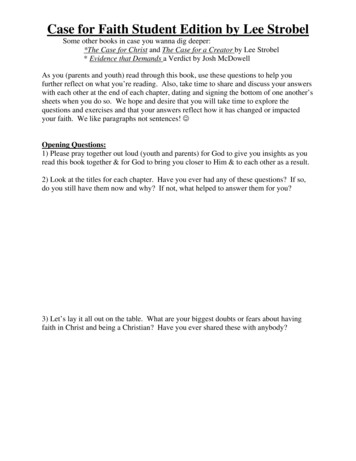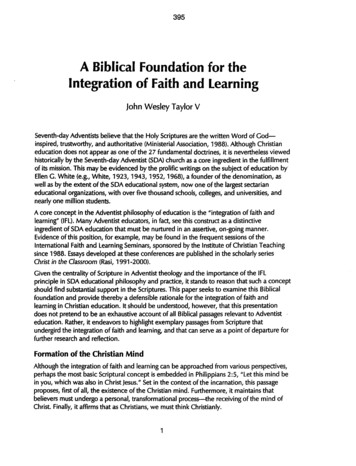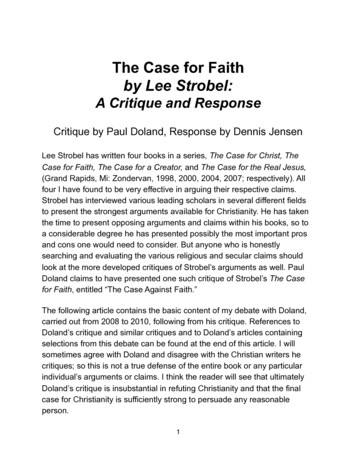
Transcription
The Case for Faithby Lee Strobel:A Critique and ResponseCritique by Paul Doland, Response by Dennis JensenLee Strobel has written four books in a series, The Case for Christ, TheCase for Faith, The Case for a Creator, and The Case for the Real Jesus,(Grand Rapids, Mi: Zondervan, 1998, 2000, 2004, 2007; respectively). Allfour I have found to be very effective in arguing their respective claims.Strobel has interviewed various leading scholars in several different fieldsto present the strongest arguments available for Christianity. He has takenthe time to present opposing arguments and claims within his books, so toa considerable degree he has presented possibly the most important prosand cons one would need to consider. But anyone who is honestlysearching and evaluating the various religious and secular claims shouldlook at the more developed critiques of Strobel’s arguments as well. PaulDoland claims to have presented one such critique of Strobel’s The Casefor Faith, entitled “The Case Against Faith.”The following article contains the basic content of my debate with Doland,carried out from 2008 to 2010, following from his critique. References toDoland’s critique and similar critiques and to Doland’s articles containingselections from this debate can be found at the end of this article. I willsometimes agree with Doland and disagree with the Christian writers hecritiques; so this is not a true defense of the entire book or any particularindividual’s arguments or claims. I think the reader will see that ultimatelyDoland’s critique is insubstantial in refuting Christianity and that the finalcase for Christianity is sufficiently strong to persuade any reasonableperson.1
At the close of this debate are some additional comments concerning mymethodology and references, as well as comments regarding Doland’sapproach. Included in this article are, to my knowledge, all of Doland’smajor arguments and many passing comments.The following amounts to nearly 150,000 words and equivalent to over 400printed pages. Given its length, some readers may wish to merely browsethrough the subject headings and follow only specific discussions. Otherswill find the entire debate interesting and edifying. The give and take ofdialogue brings out the nuanced points of argument in ways some willnever otherwise experience. This debate, because of its length, isproduced as a PDF for the reader to view. Three particularly interestingportions, one on the problem of evil, one on God condemning honestunbelievers, and one concerning the evidence of religious experience havebeen made directly accessible in the webpage itself.When quoting Doland or myself or any other speaker/writer, I have placed anumber following the speaker’s name or the quotation. The number “1” willfollow “Strobel” or one of his interviewees. Number “2” will follow Doland’sname when he first responds to Strobel’s book. Number “3” will follow myname for my response to Doland’s last statement, etc. This will help thereader follow the sometimes extended line of dialogue. I have alsounderlined those portions of my statements to which Doland has selectedto respond.2
CONTENTS(Note: italicized topics below follow chapters or sections in Strobel’s book)Objection 1: Since Evil and Suffering Exist, A Loving God Cannot . . . 622 24 25 26 29 32 36 41 42 43 44 45 46 49 67 67 67 70 80 80 80 85 88 90 94 94 104 105 110 111 117 117 120 Will God condemn intellectually honest unbelievers?Freedom, omnipotence, evil, and logical necessity, cont.Human identityGod's compensation for undeserved sufferingTheodicy 2 cont.: God needs to know if we will stop others’ sufferingAll must choose concerning God: the fate of the stillbornWhen freedom is needed and the place of speculationMajority belief in God as an argumentDoes Darwinism accommodate Scripture?Should the Bible give new scientific information?Is the God of science the God of the Bible?Isn't God complex and fine-tuned?Theistic argument from majority belief in God, contFree will, causal determinism, and the problem of evilEinstein’s inconsistency with determinismWould we all be Nazis?Do the evil deserve justice?Free will and determinism, contGod’s goodness: “kill your brothers”?Fiction “plot devices” in Gospels and Exodus?The Exodus never happened?Free will and determinism, contGod and timeTime before creation?Relativity requires a timeless God?God regretted and yet chose creation: diversity in God’s unityWould everyone believe if they thought it was true?Honest unbelievers and seeking God, againGod regretted and yet chose creation: diversity in God’s unity, contLimits to God's power and knowledgeGod and reasonCosmological argument commentsWhy would God create if God knows it all?Objection 2: Since Miracles Contradict Science, They Cannot Be True . . . 124124 131 132 134 145 151 Can we recognize divine acts?Testimonial evidence for miracles and the Book of MormonResurrection evidenceNatural vs supernatural explanations of phenomenaWould God lengthen a shorter leg?Why God doesn’t heal amputees video3
152 158 159 161 164 169 171 176 177 187 189 191 192 192 196 197 197 202 202 206 208 211 212 Natural vs supernatural explanations of phenomena, contAre miracles magic?Natural vs supernatural explanations, againDoes the Bible say God is evil?Natural vs supernatural explanations of phenomena, contMiracles and uniformity of natureFalse and capricious miraclesHow much supernatural intervention in the world?Natural vs supernatural explanations, againDo miracles need prediction?Demons causing diseaseModern science and the Bible, againDemons causing disease (2)Historicity of the Gospels & evidence for the resurrectionReason #1: God Makes Sense of the Universe's OriginReason #2: God Makes Sense of the Universe's ComplexityIs God or the universe simpler?Reason #4: God Makes Sense of the ResurrectionReason #5: God Can Immediately Be ExperiencedSense of certainty type religious experiencesReligious experience, contDesire for/against beliefSome who seek will find in the next lifeObjection 3: Evolution Explains Life, So God Isn't Needed . . . 214217 222 232 233 234 236 Probability of abiogenesis and the multiverseProbability of fine tuning of laws of natureProbability of abiogenesis, againInconsistent answers in creationismYoung vs old earth creationismYoung earth creationist critique of old earth creationismObjection 4: God Isn't Worthy if He Kills Innocent Children . . . 243243 244 258 261 263 265 267 269 270 272 273 274 279 279 God's cruel executionsDid God order genocide, rape, infanticide?Terms of peace: slavery or deathSlavery in the Law of MosesOriginal sin, realistic imputationThe age of accountability, maturity, and eternal decisionsDevaluing life by offering heavenSalvation before age of accountability?God's rights to take any lifeMaking minds from matterGod sanctioned the Canaanite genocide and 9/11The Reliability of the BibleEvidence that Jesus existedResurrection vs Caesar crossing Rubicon4
279 345 350 351 352 354 Historicity of GospelsBiblical ContradictionsThe logic or absurdity of atonementThe Pain of AnimalsDid animals only eat plants before the Flood?The Fall of Adam and animal painObjection 5: It's Offensive to Claim Jesus Is the Only Way to God . . . 359362 Cat Stevens’ religious experience367 Why do people follow other religions?Objection 6: A Loving God Would Never Torture People in Hell . . . 372379 380 381 382 385 386 388 388 389 394 Subobjection 2: Why Does Everyone Suffer the Same in Hell?Subobjection 4: Couldn't God Force Everyone to Go to Heaven?Subobjection 6: How Can Hell Exist Alongside Heaven?Subobjection 7: Why Didn't God Create Only Those He Knew Would Follow Him?Can God foreknow free choices? cont.Subobjection 8: Why Doesn't God Give People a Second Chance?The reason for life on earthIs there sufficient reason to believe or disbelieve?Subobjection 9: Isn't Reincarnation More Rational than Hell?A biblical argument for and against AnnihilationismObjection 7: Church History Is Littered with Oppression and Violence . . . 395402 406 410 412 416 417 419 419 422 424 425 425 Hitler's religion and Luther's antisemitismUnchanging moral laws and changing laws with moral contentThe enemy of humanity, atheism or Christianity?Unchanging moral laws and changing laws with moral content, contAre Christians commanded to do evil?Free will and the Holy Spirit’s restraint of evilThe value of life under atheism and ChristianityEvil Christians and reprobationMoral relativity and moral absolutesGood (or evil) because God says so?Ambiguous commandmentsChristians who don’t follow the BibleObjection 8: I Still Have Doubts, So I Can't Be a Christian . . . 428430 Problems with Strobel's presentation of the arguments434 More comments concerning form, methodology, and Doland’s approach438 References5
OBJECTION 1: SINCE EVIL AND SUFFERING EXIST,A LOVING GOD CANNOTJensen3: Doland critiques Peter Kreeft’s response to the problem of evil.After submitting the problem in surely the most powerful way it can bepresented, through examples from human history, Kreeft responds that“finite humans are not capable of understanding the plans and reasoning ofan infinite God” (Doland’s words).Kreeft originally gave an illustration of a bear caught in a hunter’s trap. Thehunter wants to release the bear and has to shoot it with a tranquilizer to doso. The bear thinks such suffering only means the hunter wants to hurt it.Doland responds that Kreeft was arguing that because we have no reasonto think God has no good reason for allowing evil that there must be a Godwho has good reason for allowing evil: there must be a greater good.Doland in turn responds that though it might be true that an all good Goddoes have reason for allowing such suffering, there is no reason to believethis is true and thus no reason to believe anything other than that God isevil, unjust, lacking power, or nonexistent. I then pointed out that Kreeftnever claimed here that there must be a God who has good reason forallowing evil.Doland’s response greatly misunderstands the argument and the onus ofproof. An answer to the problem of evil need only show a fallacy inreasoning; it need not provide evidence in order to work. We who canreason, unlike the trapped bear in Kreeft’s illustration, should recognize thatwe have no more or less reason to think that a good God has good reasonfor allowing this suffering; there may be “no reason to assume that there isa greater good to come from injustice” but likewise there is no reason toassume that it will not.The problem of evil is an argument against God’s existence or goodnessand as such has the onus of proof. If it cannot be shown to be impossible6
or improbable that there could be a God who has such good reason forallowing any such evil, then the argument from evil fails. That is all thatKreeft’s responding argument attempts. Kreeft does not conclude that“there must be a greater good,” as Doland claims, he only concludes thatthe argument from evil has not demonstrated or given evidence against thepossibility that God intends and will achieve a greater good.Doland4: [Responding to the first underlined sentence.] I’ll tell you what. I’llcome over to your house, beat the outa you, kill the rest of yourfamily, steal all of your belongings, etc. Then, I’ll say, hey, you can’t prove itwon’t be good for you, so, why are you assuming it is bad? By what basiscan you predict the future and know that you won’t be grateful for myactions sometime in the future? Would you buy this? Don’t give me this, Jensen.Jensen5: I’ve never claimed such a state isn’t bad; what I had said wasthat God can bring good out of such an evil such that it will in the long runbe a greater good. For me to suffer like this is an evil and Doland woulddeserve to face judgment for doing this. But it wasn’t just Doland who hadinflicted this pain, it was also God who allowed it. True, but God has theright to allow this or to do this if a greater good may come of it; anotherhuman does not unless it is God who directs them to do so. Just becausegood may come of such evil does not mean one should be grateful to theone who wrongly does it.Since this supposedly happened to me and since I am a Christian becauseof my evaluation of the evidence for Christianity, I have reason to believethat a greater good will in fact come of it. I can’t be grateful to Doland fordoing this but should I be grateful to God? If we know that God is going tobring a greater good out of it, then yes, if we can bring ourselves to do so,we should be grateful to God for it. But we are very human and we cannotvery easily reach that point. Few of us can say with Job, “The Lord givesand the Lord takes away, blessed be the name of the Lord.” Few of us canact upon the knowledge that our loved ones who were tragically murdered7
are likely so happy now that they would not want to come back to be withus. We cannot accept this because we still want to be with them. We knowthat we will be with them again but we do not want to wait. We don’t want toendure the separation. It is not reason that keeps us from being grateful toGod for our suffering, it is our desires. But these are also the desires weshould be willing to give up for the sake of our larger desires, if we but thinkthrough exactly what we do as Christians desire.On the other hand, if you think you have good independent evidence thatthere is no such God, then you will have reason to think that there will beno such compensation and justifying reason for this evil.Okay, so now we’ve looked at both ends of the spectrum; let’s swing backto the middle, the exact middle. Suppose we start on equal ground with nomore reason to believe than to disbelieve in this God. That is, we can onlybelieve that which is given in this particular suffering we have endured. Inthat case we would have no reason to claim that there is no God who willbring good out of this evil or any other evil. With no evidence or with equalevidence, evil in itself is no evidence against God. Because on thepossibility that there is such a God, we can think of good reasons Godcould allow evil that a greater good might occur. But even if we couldn’tthink of such reasons, we shouldn’t really expect to be able to do so.Should we be able to understand God’s mind? It seems pretty obvious thatGod could have good reasons for allowing evil that we will never have theintelligence to understand.Our true agnostic (one who thinks there is equal evidence or lack ofevidence for theism and atheism) should say, “I don’t really know that thereis a God like the Christians claim. If there is, I know such a God will bringgood out of this. But until I have reason to believe that, I don’t have reasonto think that some greater good will or will not come of this.” Should thisperson accept Doland statement, “Hey, you can’t prove it won’t be good foryou [in the long run], so why are you assuming it is bad”? Well, thisstatement might be taken to intimate that one should think the outcome will8
be good. Doland assumes this logic is bogus, and to that degree I agreewith him. The problem is that this is not what I had claimed.I did make a statement above that I think should be slightly reformulated.Assuming we are putting ourselves in the place of a true agnostic, I saidthat we “should recognize that we have no more or less reason to think thata good God has good reason for allowing this suffering.” If we conjecturethat there is a good God, then we should accept that this God would mostlikely have good reason for allowing suffering. Rather, we should notconjecture that there is or is not such a God until we have evidence.Suffering in the world is not evidence against there being such a God. Themere existence of evil in the world, in whatever degree it exists, is not initself more compatible with atheism than theism. [Last sentence added20Mr10.]True agnostics would still have reason to be angry with the culprit, but theyshould (if they are being rational and to the degree that they can be rationalat such a time) keep in mind that this may be something of which a greatergood will come. They should keep this in mind since they should be awareof the possibility that there is a God like the Christians claim. I don’t thinkanyone is unaware that there could be a good God who has the power todo something like that (bring some greater good out of some suffering).Some people repress that kind of thinking or eventually, for whatever otherreasons, come to think that there is no such God; but I think none of us arequite so closed-minded or set in our beliefs to begin with. Some people areso used to the idea that there is no such God, it is so ingrained in theirworld view, that Doland’s claims do ring true to them. I think Doland is likelyin that same group since he thinks it so obvious that he is right. But weneed to remember that if one begins with a tacit assumption that God is notthere, then of course one cannot see that a greater good might come ofmost undeserved suffering in the world.So we should be able to see that Doland’s claims amount to little more thanthe creation of an emotional image with a couple of expletives added to9
make it sound as though his views are obviously correct. A little honest andrational thinking cuts through his delusion.Doland4: [Responding to the second underlined sentence in Jensen3.]One wonders exactly what would be evidence against such to Jensen?Again, let me come over to your house and beat the outa you and seeif you don’t find that as evidence against my having good intentions.Jensen5: There are two questions here that have not been askedpreviously. The second question is, “Do we have reason to think Dolandhad bad intentions had he done this evil?” Yes we do because we knowwhat humans usually do. We know he probably would have only badintentions if he were to do this.We cannot say the same about God. We do not have the same data tocompare to produce a probability claim. I’ve presented some arguments toclaim that if we and everything else that exists do have a creator, then thiscreator is more intuitively likely to be good. If we assume that this creatorcontrols all existence, then this God also would have good reason forallowing evil. We cannot say that a good God has no good morallyjustifying reason for allowing evil while we can definitely say that beyondany reasonable doubt that Doland does not have a morally justifying reasonto do the evil he has suggested. [Last sentence added 5Jul09. Threesentences removed and other minor revisions 24Fb15.]What about Doland’s first question, What exactly would count as evidenceagainst God for me? I suppose most importantly, if I were to find myselfalive after death and if I were to experience a world, whether a spiritualuniverse or something like it, devoid of God, that would give me a verystrong inclination to disbelieve in God. Now admittedly, not even this wouldbe conclusive. It would certainly falsify important features of my currentChristian belief, but it still would not absolutely demonstrate that there couldnot be a God. A deistic God might exist who has long ago left us on our10
own. Or a good theistic God might still be there who requires us to live alittle longer (in another or other worlds after death) without directundeniable awareness of this God. If, in this spiritual world, the millenniabegin to tick away and I and everyone else I encounter still have noexperience of God, then my belief in such a theistic God will, for allpractical purposes, become nonexistent.I think there are other more practical, “in this world,” methods offalsification, though they are far from conclusive. If there were absolutely noevidence for Christianity or even theism, we should not believe it. Inprinciple we could not say that it is definitely false, but we would still be inerror to claim that it is true. We would need to wait for the next life to verifybelief in either. (This John Hick called eschatological verification. Thescenarios suggested in the last paragraph we might call eschatologicalfalsification.)So if no one had any religious experience of God or any other spiritualentities; if we had no historical evidence of prophecies or miracles; if all ofthe philosophical arguments for God could fairly easily be refuted; if thebest scientific findings pointed most clearly to a natural origin of theuniverse or a beginningless universe; if science showed us how easilychemical life could originate in our universe or most other possible butdifferent kinds of universes; if no one, or at least only very few with veryapparent psychologically unstable personalities, claimed God existed orclaimed a desire for God to exist; then I would admit that the case is prettyclosed against anyone rightly claiming that God exists. Rememberhowever, this would not give us reason to claim that God does not exist.Many people think the above state, or something close to it, is the way wefind our current state of knowledge. Many of these people honestly admitthat agnosticism, not atheism, is the proper conclusion, however.There may be some other related reasons for disbelief or absence of beliefI would admit to, but I’m sure Doland has heard enough. My question toDoland would now be very similar: What evidence would he admit to that11
would persuade him to believe? It seems that if we had God appear toDoland in any form close to God’s actual being, Doland still wouldn’tbelieve.Doland2: Arguing that there must be no God because of the suffering inthe world is sometimes called an “argument from outrage.” But should onenot be “outraged” at the injustice of the world?Jensen3: Indeed, should one? Do we have any grounds to be “outraged”or even angry if we do not know that there is no reason for this suffering?Doland thinks that the fact that the poorest people suffer most is significant.Quoting from Corey Washington’s debate with William Lane Craig,Washington claims that Craig says that generally, “the innocent, the weak,and the poor . . . suffer, so the rich can show their colors, can becourageous, and develop themselves into moral beings.”But as of yet we haven’t actually looked at any real theodicies, anyexplanations as to why God might allow evil. We have only considered thetheistic defense that we do not know that God does not have good reason.This defense says that we don’t need to know what God’s good reason isfor allowing this inequitable suffering. Developing courage may havenothing to do with it or it might be but a small and relatively insignificantpart.After having considered Kreeft’s argument for many years, I must confessthat I just don’t think it can be answered. (I first heard it from philosopherslike Alvin Plantinga and George Mavrodes in the 70’s, though that certainlywas not the first time it was argued.) If God’s intelligence to us is like ourintelligence compared to a snail’s, we really shouldn’t expect to know whatGod’s reason is for allowing evil. We have no way of knowing that this isnot the case. We can’t even say that it is probably not the case. As we willsee later, this argument which we might call skeptical theism fails only if we12
consider something like certain extreme views of hell, situations in which itis inconceivable that God could allow a greater good to occur while this evilis allowed.It is interesting that Pierre Bayle, the great fideistic philosopher who had setout the classical formulation of the argument from the problem of evil,believed the same of his argument against God. Many philosophersthroughout history have agreed with Bayle’s view (though I think withoutsufficient reason). So I think many atheists, possibly including Doland, willfind disconcerting, perhaps even astonishing, my claim that Kreeft’sargument is irrefutable.At this point I should say that I think there are good theodicies that weshould consider and that the best ones are found in the Scripture. The firstis called the recipient oriented free will theodicy. The most basic biblicaltheodicy is found in the first couple of chapters of the book of Job. Godallows undeserved suffering because God needs to know if we will hold fastto God or turn against God in the face of suffering. This is, by definition, aGod who deserves our highest commitment. So, as long as God doesdeserve our commitment and is good (and the following conditions are met)it would be evil to reject God for allowing us suffering.Two conditions must be met for this argument to work: First, God need’sgood reason for allowing undeserved suffering. Secondly, God mustprovide compensation, or, if you will, “redemption” of the evil. The reasonGod allows these evils is to see whether we will cling to God in the face ofthe emotional temptation to reject God. We have no rational justification forturning against God at this point; it is only our emotions that drive us toreject God.As for the “compensation” part, Kreeft’s quotation of Theresa illustrates this:In the next life, the worst pain in this life will seem like a night spent in abad motel. Or think of St. Paul’s words that the sufferings we now face arenot even worth comparing to the joy we will experience in the next life13
(Romans 8:18). And the pain Paul willingly endured was enormous (see 2Corinthians 11).The question applies to the atheist as well as the theist, to the one whoseeks God as well as one who hates God, for even the atheist will consideran hypothetical God when facing suffering. The atheist must inevitably facethe thought, “If there is a God and it is not inconceivable that this God hasgood reason for allowing this suffering, how will I respond to this God?”A second biblical theodicy says that while there must be undeservedsuffering in this life, it needn’t be a bad as it sometimes turns out to be. Weare to seek to alleviate suffering when we are able to do so. God needs toknow whether we will seek to have God’s heart, to become like God; tocare for the persecuted, the dispossessed, the victims. This is the observeroriented free will theodicy. Jesus went about healing the sick, casting outdemons, raising the dead. He said he had come to proclaim freedom to thecaptives. God’s Kingdom advances when this happens, he said. When anatheist or a Christian gives medicine to the sick, gives food to the hungry,prays for the suffering, shelters or hides the innocent who are oppressed,God’s Kingdom advances.In both of these theodicies I have said that God needs to know our choices.But it is not simply that God needs to know such things, it is also that webecome something different by our choices. If our choices cannot be madeby anyone else, then the only way I can be a good person is by choosing todo something good. For God to simply make me good could never makeme good in quite the same way.We must not underestimate how important it is that we see that the choiceswe make, whether when we see someone else suffer or when we aresuffering ourselves, are among the most important choices we could evermake.14
With these two basic theodicies at hand, let’s go on to see how they mightapply to the rest of Doland’s critique.Kreeft uses an example of his daughter suffering a pin prick in order tohave the achievement of threading a needle. Doland complains that “a validexplanation for a little pain does not explain extensive, intense, andapparently gratuitous pain.” But Kreeft’s point is simply that because wecan see explanations for some pains, it may be that there are goodexplanations for great pain. Isn’t that to be expected if God’s plans andunderstanding are almost infinitely beyond our own?Furthermore, given the theistic view, both the lesser pain in Kreeft’sexample and the greater pain Doland is concerned about are gratuitousonly from the mistaken viewpoint of the sufferer. The one allowing the painin both cases knows why it is being allowed. So it begs the question to saythat great pain is gratuitous or even apparently gratuitous. Also, as Pauland Theresa have pointed out (above), our greatest suffering is in the longrun more like the child’s pin prick. So a comparison of “extensive, intense”pain to a child’s minute suffering does “explain” the greater pain. It explainsit in the sense that we can see the kinds of things that would make itpossible that it would have an adequate explanation.What of Washington’s complaint of the inequity of suffering between thepoor and the rich? Well, there is and has always been inequitable,undeserved suffering and not merely between the poor and the wealthy.Nearly all undeserved suffering could be less if we were to fulfill ourresponsibility to seek to alleviate it. God does not want it to be as bad aswe have so often seen it become. But God leaves in our hands thealleviation of much suffering so that we (all people) may have theresponsibility of choosing to either create something good out of an evil orletting an evil grow unchecked.But look how horrible it is, Doland complains, shouldn’t God do somethingabout it if we don’t? “God could solve the problem [a drought in Africa], or at15
least mitigate it a great deal, by sending more rain. Is this really too muchto ask of a compassionate, miracle-working God?” But if God will providethe compensation for this suffering, that would make it almost as though ithad never happened. Also, since God wants us to make moral choicesregarding such evils—sometimes very costly choices to ourselves, eitheras the one enduring the pain or as an observer—then God would havegood reason for allowing it. But remember, even with the necessity of suchtesting, God still does not want it to be as bad as it could be without ourintervention.Doland4: [Responding to the first underlined sentence.] If this is the case[“God’s intelligence to us is like our intelligence compared to a snail’s”],then God should not be surprised that I am like the snail and don’tunderstand. If God didn’t give me enoug
The Case for Faith by Lee Strobel: A Critique and Response Critique by Paul Doland, Response by Dennis Jensen Lee Strobel has written four books in a series, The Case for Christ, The Case for Faith, The Case for a Creator, and The Case for the Real Jesus, (Grand Rapids, Mi: Zondervan, 1998, 2000, 2004, 2007; respectively).File Size: 1MB
